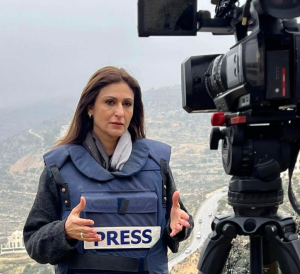Elections are high stakes, which makes them notoriously volatile and unpredictable.
Yet, as the de facto guardians of democracy, media organisations and journalists have a duty to face down risks to bring citizens objective truths, and provide instructive and constructive information.
The pursuit of this content, however, can put reporters and their families in the direct line of fire. To mitigate the dangers that exist in the field and help journalists deliver on their moral duties, WAN-IFRA Women in News has been running a series of trainings with Zambian journalists ahead of the country’s August 12 general elections.
The sessions have been led by Michael Schmidt, a media consultant and managing director at Winterslust. We spoke to Schmidt for the highlights of his training – as well as WIN Leadership Accelerator alumnae Ugandan journalist Irene Abalo (who covered her country’s elections in January 2021) and Tanzanian journalist Florence Majani (who covered her country’s October 2020 elections) for their tips for journalists covering polls.
Michael Schmidt: ‘See the story’
The most important skill a journalist can have is ‘seeing the story’. To explain what I mean by that, I’ll use the example of my father as a young army engineer when he was part of a platoon building a new road in a remote rural area.
The engineers found an obstacle in their way: a large rock that the grader could not budge. The largest, most muscular soldier picked up a sledgehammer and began hammering away at the rock. But he was getting nowhere: sweat was pouring off him after half an hour, but he’d only managed to knock tiny chips off the rock.
My father, a small-built man, had been watching and told him: “I’ll show you how it is done.” He took the sledgehammer and with one blow cracked the rock in half.
Everyone was amazed that so slight a man had achieved in one stroke what the well-built soldier was unable to. My father explained: “Can’t you see the grain in the rock? I just hit it at the right spot.”
The lesson is that journalists need to see the detail, the grain, in the stories they approach. Only by taking time to find the telling detail will they be able to strike the story from the angle guaranteed to crack the story wide open.
‘Seeing the story’ is achieved through a holistic mapping of all potential sources who could have insight into the story, their judicious assessment (all potential sources have strengths and weaknesses), and devising a tactical plan on how best to strike at the story (the ideal sequence of interviews and fact gathering, and anticipating where problems might lie and how to navigate them).
And they need to do all this with an eye on continually refining the central concept (discarding what doesn’t work), which includes determining how deep one needs to go to prove one’s case. They also need peripheral vision to see how broad the story might be in terms of its impact (looking for similar case studies for comparative analyses).
In addition to sharpening their skills on seeing the story, I would recommend that journalists spend as much time as they can in the field because nothing can replicate being present at the scene – and their safety in covering potentially volatile elections is better secured by good grassroots community contacts.
Working in the field also allows one to hold politicians to account by testing their claims against the people’s daily realities – a deliberate move away from reporting politics to reporting public interest.
Irene Abalo: ‘Get your mind in the game’
I covered the 2021 January elections in Uganda, and the things that I saw during polling and continued to see after that require that one be mentally prepared for what’s out in the field. You need to be sure you have been properly facilitated to take care of yourself, to move around and to survive.
Many journalists imagine that covering an election is about picking up a notebook or camera, and going out to the field. But you need to carry out background checks on the candidates you’re going to cover before you go out. Know what they have said before, what they are likely to say today, and what value they add to voters. Before you go out, arm yourself with information.
You also need to be sure that your mind is ready for the assignment. You may find yourself in an environment that is hard to reach or lacking in essentials – how mentally prepared are you for the twists and turns in the journey you’re about to take?
Don’t go into an assignment expecting to write a story based on what you see – be open to any possibilities. Write the stories that go beyond the obvious, beyond what the candidates are saying. Pick out details from the people on the ground; keep an eye out for things that are outside the norm.
Try as much as you can to remain independent and free to move around. Be careful about being embedded with candidates because they determine how much of the story you can pursue. If they say you have to pack up and leave, you have no choice but to abandon the story and move. However, if that is the only way to cover a story, be cautious about who you trust. They may try to sabotage you or attempt to bribe you to bury an angle. The value of your journalism and its service to humanity is way more important than any cheap payoff they offer.
Never go out alone. Know your team and who you are safe with. I was beaten while covering Bobi Wine in Uganda and got a tissue injury that is just now healing. I had gone out as a print journalist but was also with a TV team from my organisation. I stuck with them even after being attacked until we could all leave the scene together.
You need to research the history of the candidates you’re covering – know what kinds of reactions they elicit and make sure you have the mental fortitude for whatever happens out in the field. When covering Bobi Wine as a candidate, you were never sure when there would be teargas or running battles between voters and security officials. So I would dress in jeans, T-shirts and comfortable shoes that allow me to run. However, don’t get into a situation that could be dangerous without being trained on how to protect yourself or an injured colleague. You need to know what to do if a riot breaks out, how to create makeshift gas masks if necessary, and how to exit a volatile scene.
Ensure people know where you are. Your family and editors must know what you’re doing, and if you get into trouble, let them know. On the day I was beaten, my editors were expecting a live radio update so we were in constant communication. I told them when I saw soldiers approaching me, when a truckload of officers arrived at the scene and when I spotted a commander known for being ruthless. My editors kept saying if I sense danger, I should leave. But just as I was reading this final message, a group of us journalists were attacked. So be aware of your environment. And if you must withdraw from a dangerous scene, exit as soon as you can.
Florence Majani – ‘Your loyalty is to your audience’
The first rule of being out on the field is: rely on the ethics, principles and morals that guide your craft. As a member of the Fourth Estate, you do not exist to benefit a government, political party or any individual. Your loyalty is to the citizens of the country you operate in; you are responsible for keeping them informed.
Before you leave for an assignment, make sure you have sorted out everything on the home front. Being called while out in the field about gaps in the home can throw you off. So ensure things are settled at home and deal with any pending personal matters.
If you get into a situation that is politically volatile, make sure that in addition to informing your family and editors about where you are, you give the media council or journalists’ association in your country your location. They should also know when you expect to leave. And if you get into trouble or fear that you may be under surveillance, alert them. Additionally, prepare a security check-in system with your organisation to give yourself an extra layer of safety.
Carry out a reconnaissance where possible. Examine the location of poll stations in advance, know the exits from buildings, ways to leave the location and where the nearest hospitals and police stations are. And if you have a press card, carry it with you. Make sure it’s somewhere easily accessible. If you can take a press jacket with you, use it. In areas with social unrest, it will be easier for the police or other security officials to identify you as a journalist.
Finally, speak to other journalists for tips on how to be safe when in the field, read widely on security measures and save the contacts of people you can reach out to in case of emergencies.








